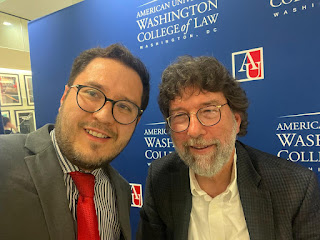On the first day of class, Professor Hunter asked, “Why did you sign up for this international environmental law class?” I, somewhere between ignorance and conviction, replied, “To save the world—why else?” He smiled beneath his gray beard and said, “Yes, that is indeed the most substantial approach, perhaps the only one that makes sense.” He said it with enthusiasm and faith, which reignited a belief I had carried within me for years—one I first felt more than fifteen years ago, when a group of friends and I planted trees in the ravines of Guatemala City.
Through his classes, his books, and personal conversations, I began to see a real vision take shape. I came to understand the possibility of building theoretical support, grounded in a financial framework, to bring to life an idea that had lived in my mind for decades: that Guatemala can truly honor the etymology of its name—to be a land of trees.
I read his texts with great devotion and came to understand the political, economic, and legal dynamics behind international environmental conventions and treaties. I never stopped thinking about Guatemala, and David encouraged me to do so—he consistently urged me to ground my work in my home country. We also lived through the tumultuous events of 2023, when the inauguration of President Bernardo Arévalo was at risk. This piqued his curiosity, and he would ask me weekly how I was following the intense political drama unfolding in the international media and within the Organization of American States.
I enrolled in two courses with him and worked with him on an independent study. In every assignment and essay, I explored Guatemala. I researched a case in which the Constitutional Court ruled to protect the right of a mayor in San Pedro La Laguna to impose a ban on plastic—basing the resolution on international treaties and conventions. That experience showed me that Guatemala is a noteworthy example of applying international law to environmental matters.
Under Professor Hunter’s guidance, I investigated the intersection of environmental law and business. Through this work, I began developing ideas for personal and entrepreneurial projects, exploring how the country could benefit from a robust carbon market strategy and the potential advantages of aligning profit, entrepreneurial standards, and sustainable development. Conversations with him constantly pushed me to think more broadly and to believe even more in the possibility of undertaking groundbreaking projects.
His writings, which describe international treaty-making processes in great detail, also guided me as I worked on proposals to reinvent the international financial system to meet the planet’s urgent climate needs. In his farewell speech, delivered in the grand hall of the Washington College of Law at American University, he humbly stated—with his characteristic humor—that he was not just a professor but also an activist. He saw teaching as a means of influencing others—and he did so effortlessly. At the end of every class, there was always a line of students eager to ask him questions. He also hosted the classic BBQ at the end of each semester at his beautiful home in Takoma Park.
For decades, he has trained people to think critically and inspired them to bring their projects to life. The story of how the Montreal Protocol was approved—spearheaded by his great friend Durwood Zaelke—is captivating. This legal instrument, which banned CFC gases, led to the rebuilding of the ozone layer—an unprecedented success that David credits to Durwood. In the same speech, David honored Durwood as one of the individuals who has done the most for climate change. I believe David himself has also done—and continues to do—a tremendous amount.
Professor Hunter introduced me to many people, and simply being associated with him earned me instant respect. His authenticity is impossible to fake. He is an honest person who does not shy away from irony or uncomfortable truths—like the harsh reality that the planet is not on the right path. Yet, he maintains a sense of determination and continues to plant seeds of hope in all of us who had the privilege of learning from him. Now that he has retired from teaching, he leaves us with the responsibility to honor him through belief, effort, and creativity.
Thank you so much, Professor Hunter.



